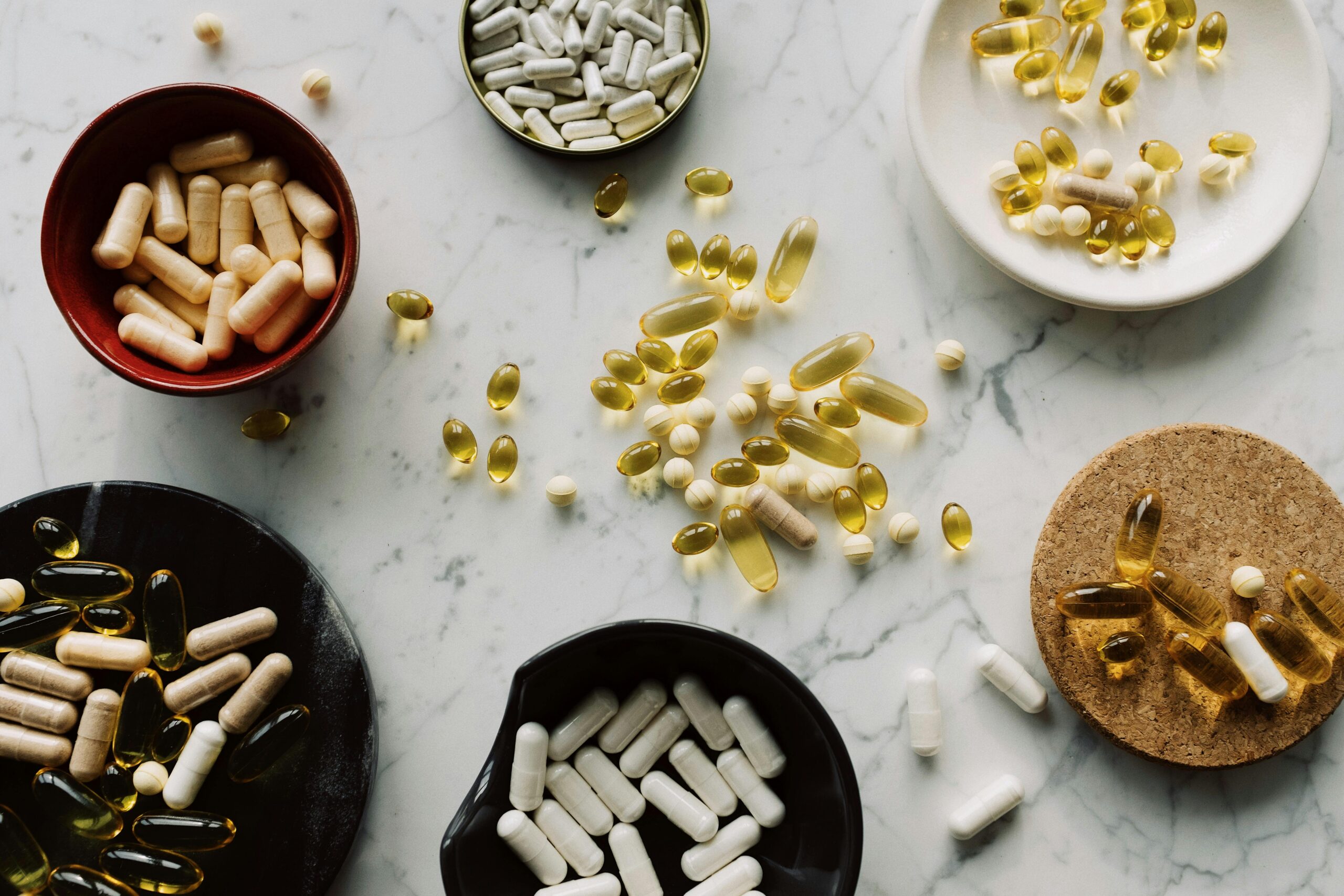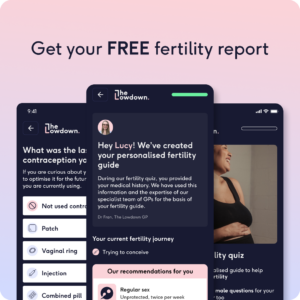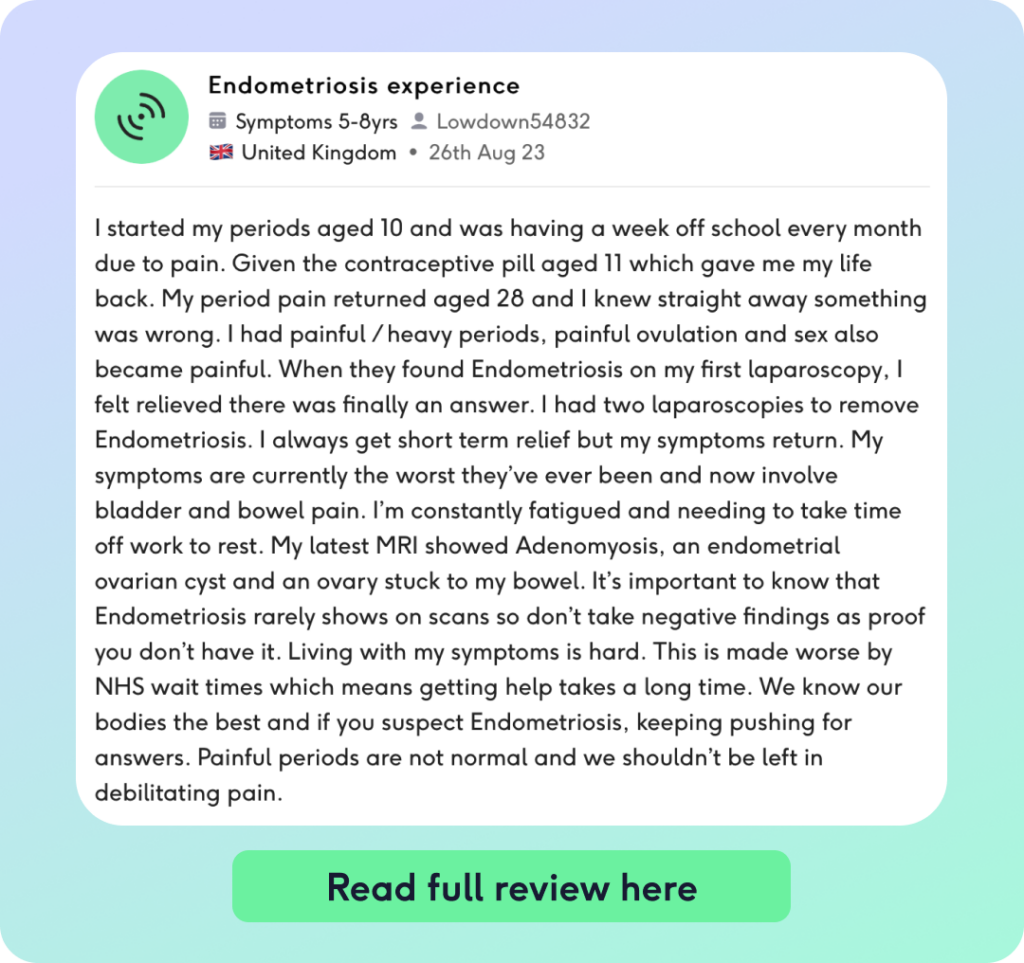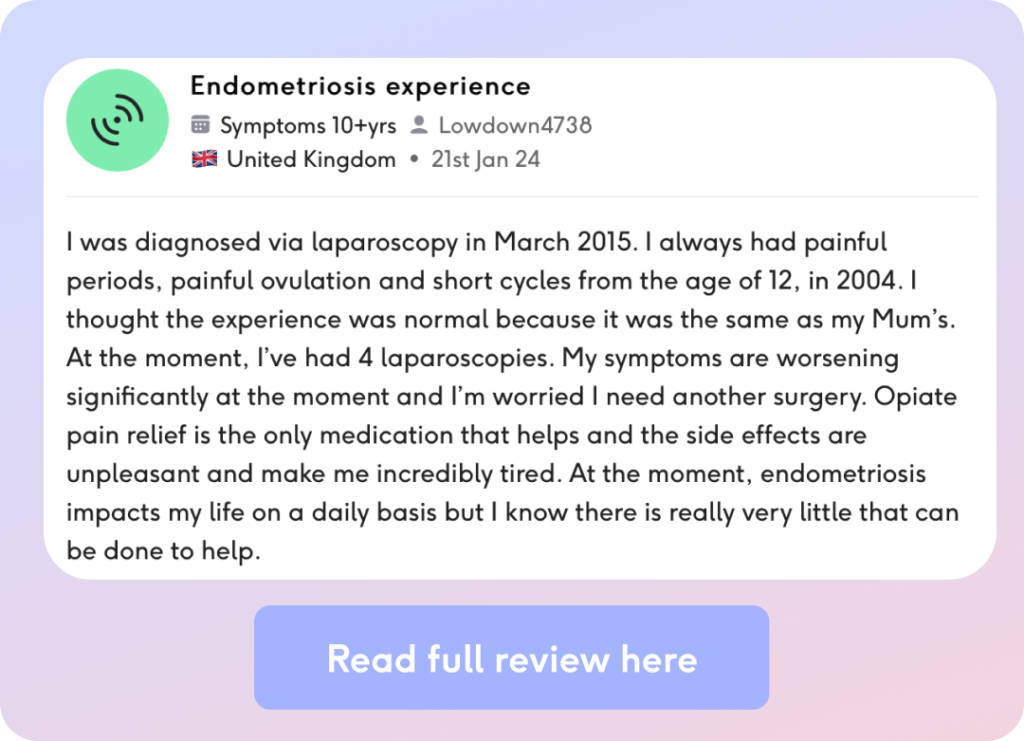
Is ovulation pain normal? Your endometriosis, fertility & menopause questions answered
In this article
What's the lowdown?
Ovulation pain can occur about 14 days before your period starts and occurs when an ovary releases an egg.
Nobody is quite certain about why women experience ovulation pain, but there is a theory that it is because of the egg breaking through the ovary wall. When this happens a small amount of fluid or sometimes blood is released, which in turn irritates nearby nerves causing a woman to experience pain.
It can last for as little as two minutes, to as long as two days.
Ovulation pain is usually nothing to worry about, however if it increases over time or gets to the point where it interferes with daily functioning then we recommend that you book an appointment with your doctor.
You’d think that cramps once a month would be enough, so it can come as a surprise when we’re keeled over two weeks after our period with no clue as to what could be causing the pain!
For some women, ovulation pain is short-lived or unnoticeable, but for others, it may be a longer-lasting discomfort that is more severe in nature. Ovulation pain is completely normal. But there may be situations where it is more acute and should be assessed by a doctor.
Here we give the lowdown on ovulation pain and how to recognise what is normal and what’s not.
What is ovulation pain?
Ovulation pain, also known as mittelschmerz (German for middle pain) is when some women get a one-sided pain in the lower part of their abdomen when they ovulate. This pain will occur about 14 days before your period starts and is when an ovary releases an egg during the menstrual cycle 1.
Why is ovulation is painful for some people
Nobody is quite certain about why women experience ovulation pain, but there is a theory that it is because of the egg breaking through the ovary wall. When this happens a small amount of fluid or sometimes blood is released, which in turn irritates nearby nerves causing a woman to experience pain.
Is ovulation pain normal?
It is completely normal to have ovulation pain and is one of the symptoms of a woman’s periods. Women can experience the pain differently with some having it last only a few minutes, whilst others may find it can last up to a couple of days. If you do experience pain that is very severe, then this is not normal, and we would advise you to make an appointment with your doctor or talk to one of our own doctors at The Lowdown.
How many days after your period do you ovulate?
You will usually ovulate about 12 to 14 days before your next period starts. This is when a woman is at her most fertile. If you have regular cycles it may be possible to calculate how many days after your period starts you will likely ovulate 2.
What does ovulation pain feel like?
Ovulation pain can often feel like a dull cramp, or some women may find it feels like a sharp and sudden twinge. For some people, this feels like period pains. A woman will typically feel ovulation pain in their lower abdomen and they may feel ovulation pain on the right side or ovulation pain on the left side depending on which ovary is releasing the egg.
How long does ovulation pain last?
How long the ovulation pains last depends on the person. For some women, it may be a pain that lasts a couple of minutes or shorter, whilst others may experience ovulation pain for up to two days.
How to ease ovulation pain
If you are looking for ways to help reduce the pain from ovulation then we would recommend using a Myoovi. It works using transcutaneous electrical nerve stimulation (TENS), which helps with pain relief. By following the Myoovi link on our website you can grab a great discount on the product!
Ovulation pain and bleeding
A woman may experience bleeding alongside ovulation pain. Don’t worry – this is totally normal! Check out our blog on ovulation bleeding and spotting to find out more
Can ovulation cause bloating?
A woman may experience bloating whilst they are ovulating as the change in hormones during this time can result in water retention. Bloating related to ovulation may last for around three days but also can last up to seven days after the egg is released.
Can you still get ovulation pain after menopause?
Menopause is defined as when a woman stops having periods. It is due to a natural decline in oestrogen levels as you get older. Menopause normally occurs between the age of 45 and 55. During menopause, your ovaries will stop producing as much oestrogen and will no longer release an egg each month. You will therefore no longer be able to get pregnant. If you are no longer releasing an egg each month you will not experience ovulation pain.
Does ovulation pain indicate fertility?
Ovulation pain happens when an egg is being released, which is normally about 14 days before a woman’s period starts. This is when a woman is most likely to get pregnant, so therefore ovulation pain can be an indication of when a woman is in her fertile window.

Are you fertile when you feel ovulation pain?
As ovulation pain occurs when your ovaries release an egg, it is considered to be a time when you are your most fertile.
When you feel ovulation pain is it too late to conceive?
There is a window of about 12 – 24 hours after ovulation when a woman is able to get pregnant, but after this, the egg will have left the fallopian tube and a woman will not be able to get pregnant in that menstrual cycle.
How long are you fertile after ovulation pain?
Following ovulation, the released egg hangs around for up to 12-24 hours. This is because once the egg has been released – which is what we think causes ovulation pain – the egg will only stay in the fallopian tube for a short time. Once the egg has left the fallopian tube then a woman will not be able to get pregnant in that menstrual cycle.
Can endometriosis cause ovulation pain?
Endometriosis is an inflammatory condition where tissue that is similar to the lining of the womb starts to grow in other areas such as the ovaries or fallopian tubes. Symptoms of endometriosis include pelvic pain, pain during or after sex, or severe period pains. If a woman has endometriosis she may experience severe ovulation pain3. The Myoovi is recommended again for people who experience ovulation with endometriosis.
Endometriosis is a complex condition that we cannot summarise in one paragraph. You can find more information and endometriosis here. We’ve also written a guide on contraception options which may help with endometriosis symptoms.


Can contraception help with ovulation pain?
Simply , yes. Hormonal contraception such as combined pill, progesterone-only pill, vaginal rings, patch, implant, injection and intrauterine hormonal device works to prevent pregnancy by suppressing ovulation. No ovulation means no ovulation pain!
If you are really struggling with ovulation pain, your doctor might suggest contraception as a treatment option4.
Ovulation pain – when to see a doctor?
Whilst ovulation pain is normal, there are some cases where ovulation pain may be considered more severe or come with other symptoms such as heavy bleeding. If your ovulation pain increases over time or gets to the point where it interferes with daily functioning then we recommend that you book an appointment with your doctor. It is recommended to keep a diary of when the pain is occurring during your menstrual cycle and whether the pain is temporary or long-lasting.
If you would like to simply book an appointment for an ultrasound or MRI to determine whether you may have endometriosis, by using scan.com you are able to easily book in somewhere local to you whilst also skipping the NHS waitlist.
How will a doctor diagnose ovulation pain (mittelschmerz)?
To help in diagnosing ovulation pain, a doctor will ask for a detailed account of your medical history, with a focus on your menstrual cycle. They may also perform a pelvic exam to check for any underlying conditions that could be causing the discomfort instead of ovulation pain.
We hope you’ve found this a useful guide to ovulation pain, with some idea of what’s normal and when to seek medical advice! And as always if you’re not sure, speak to your GP.
Our medical review process
This article has been medically reviewed for factual and up to date information by a Lowdown doctor.

